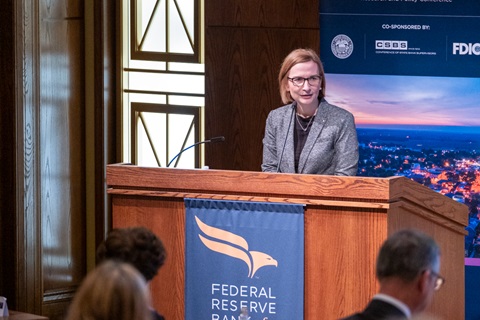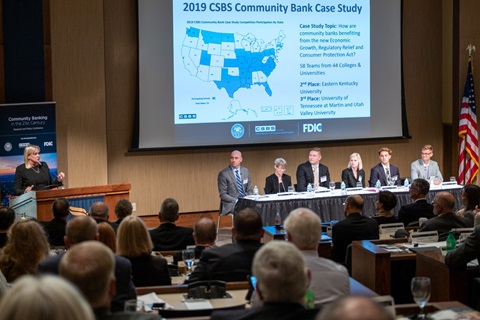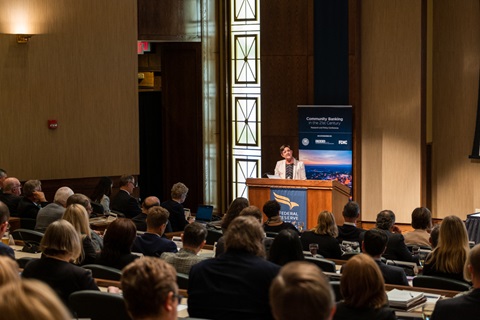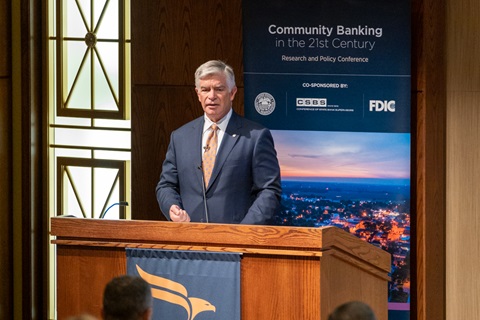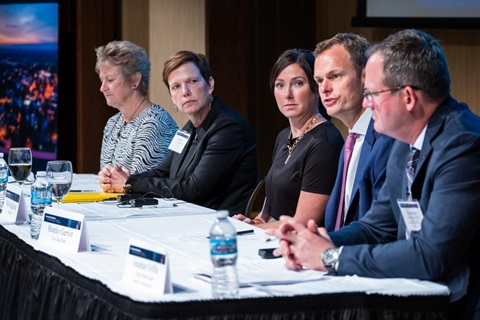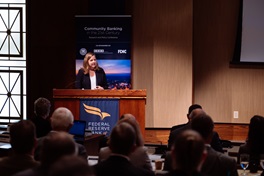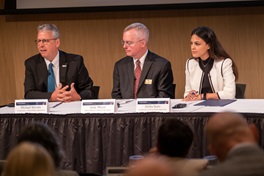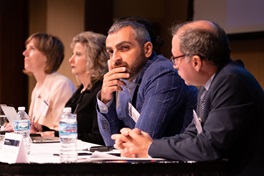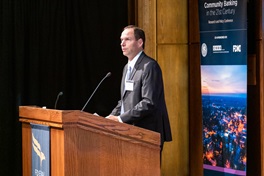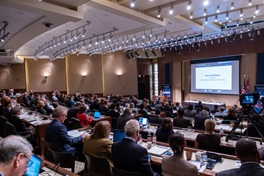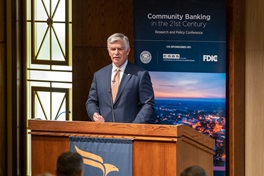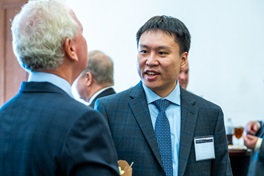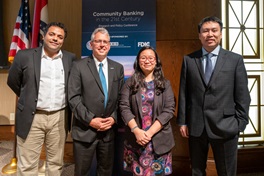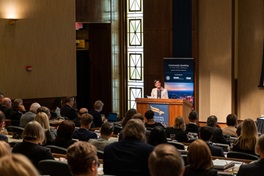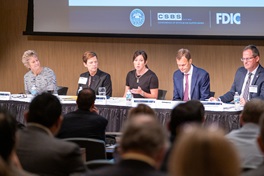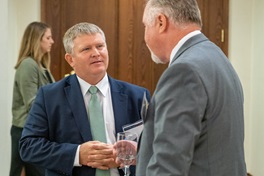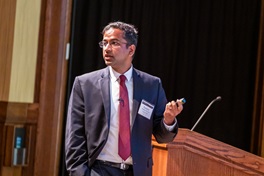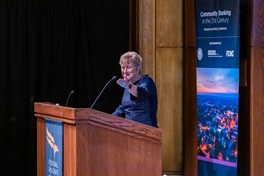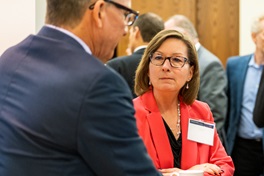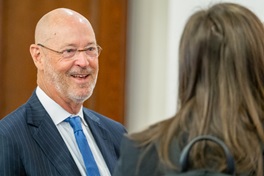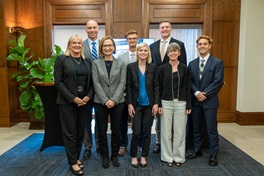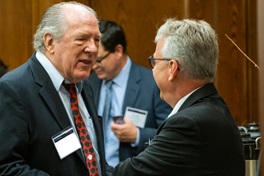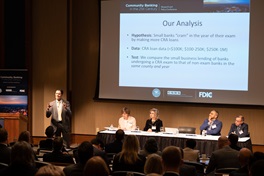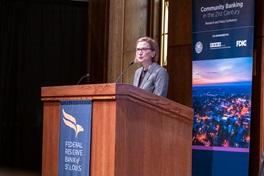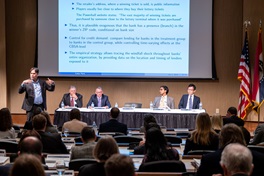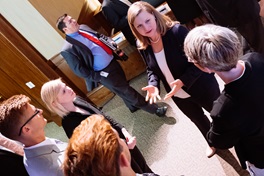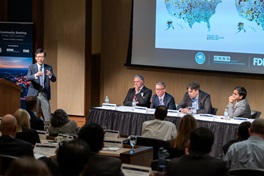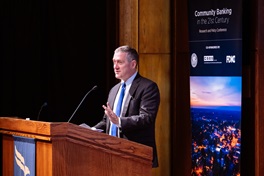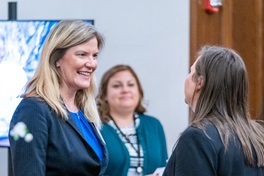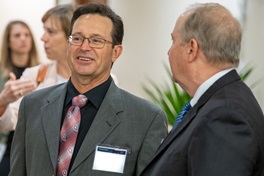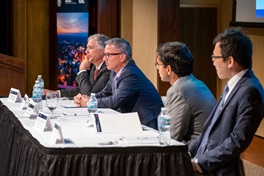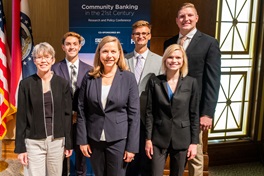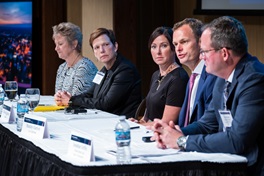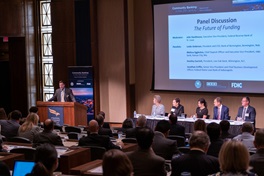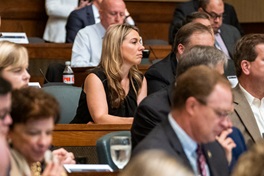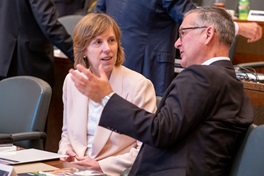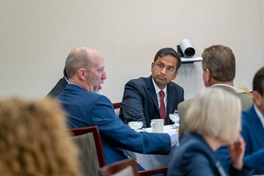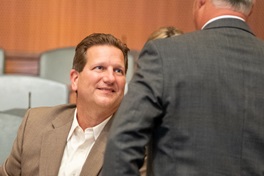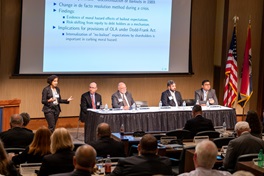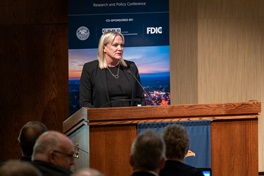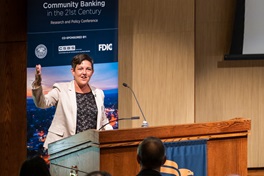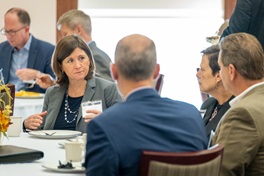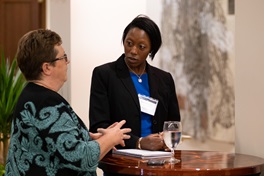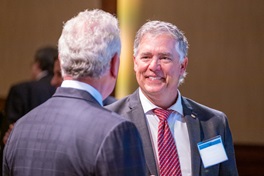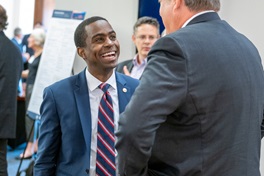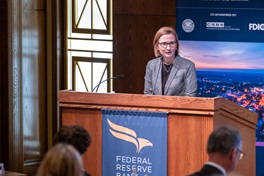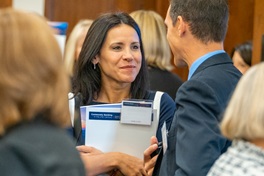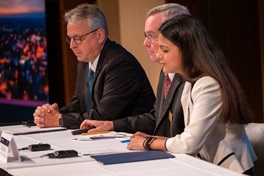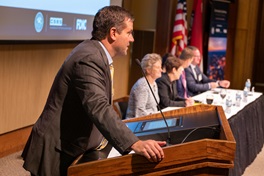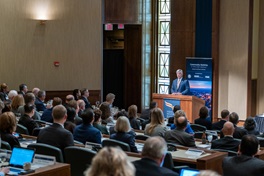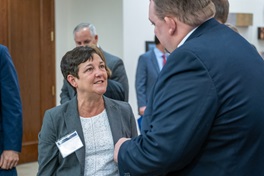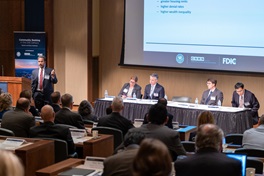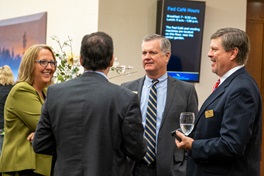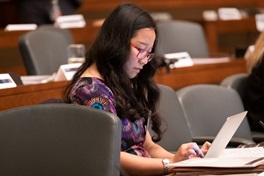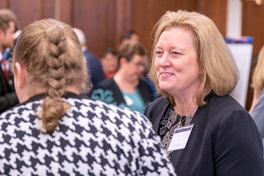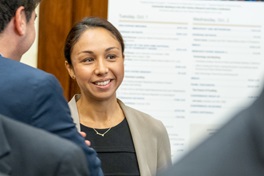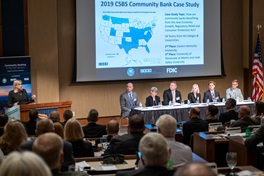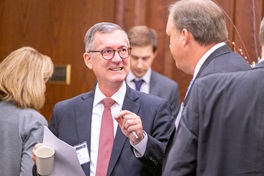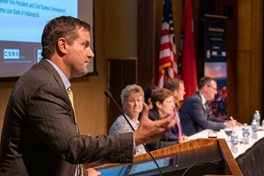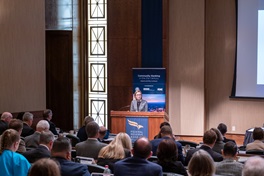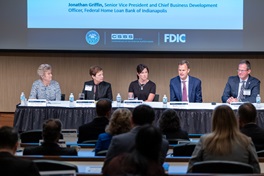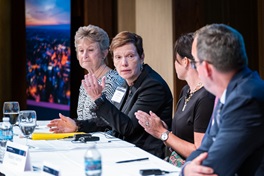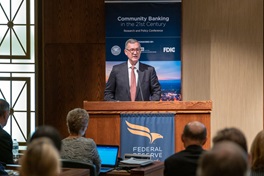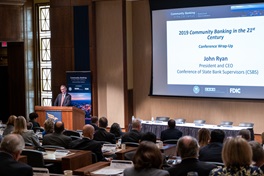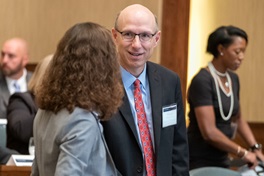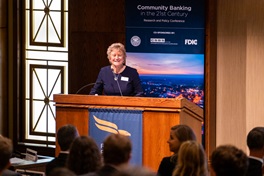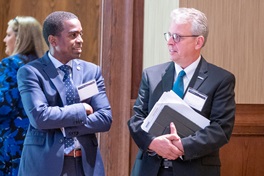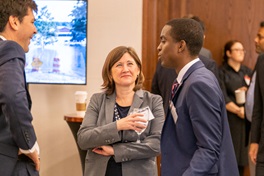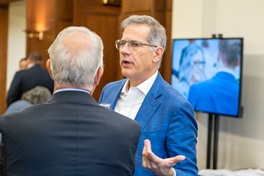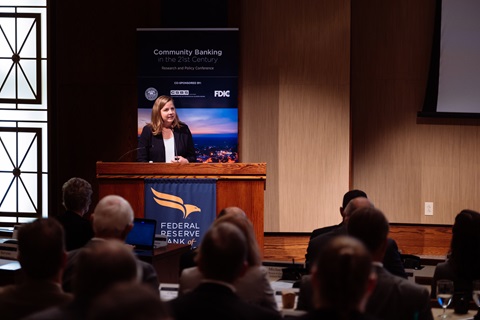
2019 Community Banking in the 21st Century Research and Policy Conference
Taking place October 1-2 at the Federal Reserve Bank of St. Louis, the research conference will bring together community bankers, academics, policymakers and bank regulators to discuss the latest research on community banking.
Community Banking in the 21st Century
The seventh annual Community Banking in the 21st Century research and policy conference—sponsored by the Federal Reserve System, the Conference of State Bank Supervisors (CSBS) and the Federal Deposit Insurance Corp. (FDIC)—will take place Oct. 1-2 at the Federal Reserve Bank of St. Louis. The conference brings together community bankers, academics, policymakers and bank regulators to discuss the latest research on community banking.
The conference presents an innovative approach to the study of community banks. Academics explore issues raised by the industry in a neutral, empirical manner and present their findings at the conference. Community bankers contribute to an annual national survey prior to the conference and then participate directly in the conference by serving as keynote speakers and panelists and by providing feedback to the research presented.
For more information, please contact conference@communitybanking.org.
Conference Agenda
Gateway Auditorium, 6th Floor | Federal Reserve Bank of St. Louis
October 1-2, 2019
Download as PDF
- Tuesday, October 1
-
Welcome
 Bret Afdahl
Bret Afdahl
Chairman,Conference of State Bank Supervisors (CSBS); Director of Banking, South Dakota Division of Banking
-
Morning Keynote
-
Discussion of the 2019 CSBS National Survey of Community Banks
 Presenter: Michael Stevens
Presenter: Michael Stevens
Senior Executive Vice President, Conference of State Bank Supervisors - CSBS
Presentation of the 2019 CSBS National Survey of Community Banks -
Break
-
Research Paper Session 1
Small Business Lending Moderator: Diane Ellis
Moderator: Diane Ellis
Director, Division of Insurance and Research, Federal Deposit Insurance Corp.- FDIC
Who's Holding the Bag? Regulatory Compliance Pressure and Bank Risk-ShiftingLamont Black, Driehaus College of Business, DePaul University Chicago, IllinoisTo Ask or Not to Ask? Bank Capital Requirements and Loan CollateralizationArtashes Karapetyan, ESSEC Business School, ParisIs There a Benefit from Reduced Regulation on Small Banks?Francesco Vallascas, University of LeedsModerator and Discussant ResponseSmall Business Lending: Moderated Q&A -
Afternoon Keynote
-
Lunch
-
Research Paper Session 2
Local Shocks and Spillover EffectsCapital Mobility and Regulation Frictions: Evidence from U.S. Lottery WinnersCarlos Parra, Pontifical Catholic University of ChileNatural Disasters, Loan Loss Accounting and Subsequent LendingRajesh Vijayaraghavan, University of British Columbia, Columbia Sauder School of Business, VancouverBank Branching Networks and Geographic Contagion of Oil Price ShocksTeng Wang, Board of Governors of the Federal Reserve SystemLocal Shocks and Spillover Effects: Moderated Q&A -
Break
-
Research Paper Session 3
Responses to Changes in Regulation or Supervision Moderator: Michael Gibson
Moderator: Michael Gibson
Director, Division of Supervision and Regulation, Board of Governors of the Federal Reserve System
 Community Bank Discussant: Craig Goodlock
Community Bank Discussant: Craig Goodlock
Chairman and CEO, Farmers State Bank of Munith, Munith, Mich.
Risk-shifting, Regulation and Government AssistancePadma Sharma, Federal Reserve Bank of Kansas CityDeregulation, Market Structure and the Demise of Old School BankingStefan Lewellen, Pennsylvania State UniversityReliance on Third Party Verification in Bank SupervisionYadav Gopalan, Indiana University, Kelley School of BusinessResponses to Changes in Regulation or Supervision: Moderated Q&A -
2019 CSBS Community Bank Case Study Winner Presentation: Juniata College, Huntingdon, Pa.
Student TeamDavid Hibner, Katherine Migatulski, Wyatt Page and Matthew Schaeffer, Juniata College
Faculty AdvisorSinéad Gallagher, Assistant Professor of Accounting, Juniata College
Community Bank PartnerGregory Hayes, President and Chief Operating Officer, Kish Bank, Belleville, Pa.
-
Dinner Reception
-
Evening Keynote
- Wednesday, October 2
-
Breakfast and Networking
-
Morning Keynote
-
Break
-
Research Paper Session 4
Technology and BankingSmall Bank Lending in the Era of Fintech and Shadow Banking: A Sideshow?Kandarp Srinivasan, D'Amore-McKim School of Business, Northeastern University, Boston, Mass.What is Fueling the Fintech Lending Revolution? Local Banking Market Structure and Fintech Market PenetrationJohn Hackney, University of ArkansasBank Technology: Productivity and EmploymentZhonghua Wu, Florida International UniversityTechnology and Banking: Moderated Q&A -
Break
-
Panel Discussion: The Future of Funding
Panelists Jonathan Griffin
Jonathan Griffin
Senior Vice President and Chief Business Development Officer, Federal Home Loan Bank of Indianapolis
-
Lunch (optional)
Research Papers, Authors and Key Findings
Research Paper Session 1
Small Business Lending
Who's Holding the Bag? Regulatory Compliance Pressure and Bank Risk-Shifting
Authors: Lamont Black, Driehaus College of Business, DePaul University Chicago, Illinois; John Hackney, University of Arkansas
Key Findings:
This paper finds evidence that compliance pressures from the Community Reinvestment Act (CRA) lead to an increase in small business lending by small banks but not by large banks. Specifically, small banks increase origination volumes of their smallest business loans by 19 percent during CRA exam years. The paper also finds that these loans are more likely to be funded with Small Business Administration (SBA) government guarantees. These loans, however, demonstrate higher default rates. They are also less likely to be a revolving loan. These two factors suggest some risk-shifting onto the government during CRA exam years. The paper concludes that more CRA-induced lending leads to a short-term increase in employment for local small businesses but it also results in a long-term decrease in employment as the increased risk of the loans made in CRA exam years is realized.
To Ask or Not to Ask? Bank Capital Requirements and Loan Collateralization
Authors: Artashes Karapetyan, ESSEC Business School, Paris; Hans Degryse, KU Leuven, Flanders, Belgium; Sudipto Karmakar, Bank of Portugal
Key Findings:
This paper examines the impact of higher capital requirements on a bank’s decision to offer collateralized, rather than uncollateralized, loans. The authors analyze the 2011 European Banking Authority (EBA) capital exercise, which required some banks to increase regulatory capital but not others. This exercise made secured lending more attractive (versus unsecured lending) for the affected banks since secured loans require less regulatory capital. The authors show that banks more frequently require loans to be collateralized, but less so for relationship borrowers.
Is There a Benefit from Reduced Regulation on Small Banks?
Authors: Francesco Vallascas, University of Leeds; Abhishek Srivastav , University of Edinburgh
Key Findings: The authors in this paper show that reduced regulations on small bank holding companies (BHCs) in the U.S., implemented in 2015, boosted small business lending at the BHCs’ affiliated commercial banks without affecting risk-taking or transparency. Increases in small business lending were stronger when the parent BHC was significantly below the 2015 regulatory asset threshold ($1 billion). Further, the regulatory relief that was granted in 2015 shows positive implications for the funding opportunities of the affiliated commercial banks and has a real impact on local economies.
Moderator and Discussant Response
Small Business Lending: Moderated Q&A
Research Paper Session 2
Local Shocks and Spillover Effects
Capital Mobility and Regulation Frictions: Evidence from U.S. Lottery Winners
Author: Carlos Parra, Pontifical Catholic University of Chile
Key Findings:
This paper analyzes how banks reallocate capital across lending markets following funding shocks. Funds are transmitted across markets, but allocations are five times greater in the state in which the positive funding shock occurred. The paper also shows how banking regulation can negatively affect fund mobility and loan performance. The paper concludes that state boundaries matter for capital mobility in part because of regulatory distortions.
Natural Disasters, Loan Loss Accounting and Subsequent Lending
Authors: Rajesh Vijayaraghavan, University of British Columbia, Columbia Sauder School of Business, Vancouver; Sandra Chamberlain, University of British Columbia; Yuxiang Zheng, University of British Columbia
Key Findings:
This paper examines the relationship between loan loss accounting policies and a bank’s ability to respond to an increase in local demand for loans. The authors first examine how natural disasters impact loan losses and find that a natural disaster shock on loan loss provisioning is negligible. However, at large banks, there is an increased weight on loan loss indicators during the four quarters that encompass a natural disaster. The paper suggests that smaller banks, which have policies of over-reserving for loan losses, exhibit greater responses to increased loan demand in the year of a disaster, which is consistent with the theory that loan loss provisioning can influence a bank’s ability to lend in the face of demand shocks for loans.
Bank Branching Networks and Geographic Contagion of Oil Price Shocks
Author: Teng Wang, Board of Governors of the Federal Reserve System
Key Findings:
This paper studies the role of bank branch networks of U.S. regional banks in transmitting commodity price shocks across the economy. Oil price collapses have adversely affected regions with high concentrations of their workforce in the oil and gas industry, which contributes to a higher rate of loan defaults and lower deposit inflows into local bank branches. The author also shows that smaller regional banks operating in counties most affected by an oil price collapse were forced to sell their liquid asset holdings and contracted their credit to small businesses and mortgage borrowers in counties that were not affected by falling oil prices. The paper also shows that banks with exposure to a negative oil price shock contract lending more in counties with more opaque borrowers suggesting that these borrowers could be disproportionally affected in times of liquidity scarcity.
Local Shocks and Spillover Effects: Moderated Q&A
Research Paper Session 3
Responses to Changes in Regulation or Supervision
Risk-shifting, Regulation and Government Assistance
Author: Padma Sharma, Federal Reserve Bank of Kansas City
Key Findings:
This paper examines the moral hazard effects of less stringent regulatory and resolution standards on thrift institutions in the midst of the Savings and Loan (S&L) crisis. In the aftermath of the failure of the industry deposit insurer (the FSLIC) in 1989, thrift institutions became subject to more enhanced regulation and oversight. The paper finds that, following the implementation of the enhanced regulatory regime, thrifts with a high probability of failure increased their composition of safe assets and reduced the share of high-risk loans on their balance sheets relative to thrifts with a low probability of failure, thereby providing evidence of moral hazard incentives within the thrift industry in the previous regime. The paper provides specific evidence of risk-shifting from equity-holders of stock thrifts toward debt-holders prior to the 1989 reforms by comparing the changes in the composition of the balance sheets of stock thrifts with those of mutual thrifts. The paper further demonstrates that in future crises, shareholder expectations around government assistance will be crucial for the policies aimed at reducing moral hazard (such as the Orderly Liquidation Authority under Title II of the Dodd-Frank Act) to succeed.
Deregulation, Market Structure and the Demise of Old School Banking
Authors: Stefan Lewellen, Pennsylvania State University ; Emilio Bisetti, Hong Kong University of Science and Technology; Stephen Karolyi, Office of the Comptroller of the Currency (OCC)
Key Findings:
The authors construct a new measure of regulatory “intensity” that allows them to separately identify the effects of deregulation on competition and investment. The authors find that increased competition leads to higher deposit funding costs and reduces bank net interest margins and overall profitability. In response to increased competitive pressures, banks increase their risk-taking, shift their business models toward new sources of non-interest income, and increase the likelihood that they’ll be acquired by another bank. The paper’s findings support the idea that reductions in bank charter values lead to increases in bank risk-taking.
Reliance on Third Party Verification in Bank Supervision
Authors: Yadav Gopalan, Indiana University, Kelley School of Business ; Andrew Imdieke, University of Notre Dame; Joseph Schroder, Indiana University; Sarah Stuber, Texas A&M University
Key Findings:
This paper examines how internal controls regulation affects bank supervision by exploiting a change in size thresholds for internal control audits required under the Federal Deposit Insurance Corporation Improvement Act (FDICIA). The authors demonstrate that banks that became exempt from the internal control audit requirements increased their reported level of non-performing loans compared to banks that were not exempt. However, the increase in reported nonperforming loans is not accompanied by increases in past due loans. This suggests that the newly exempted banks were being more forthcoming in their reporting rather than experiencing operational deterioration. Furthermore, the authors find evidence that bank examiners increased regulatory scrutiny on the newly exempted banks. The authors conclude that third-party verification is an imperfect substitute for bank supervision and efforts to rely upon externally generated attestations may heighten bank risk.
Responses to Changes in Regulation or Supervision: Moderated Q&A
Research Paper Session 4
Technology and Banking
Small Bank Lending in the Era of Fintech and Shadow Banking: A Sideshow?
Authors: Kandarp Srinivasan, D'Amore-McKim School of Business, Northeastern University, Boston, Mass.; Taylor Begley, Washington University in St. Louis
Key Findings:
This paper finds that the share of mortgage lending by the four largest U.S. banks dropped (30% to 23%) from 2009 to 2013 in the aftermath of the financial crisis. Aggregate patterns suggest the gap was filled by nonbank lenders (increasing from 26% to 37%). Despite the rise in nonbank lending, the authors show that small banks were twice as responsive as nonbanks in filling the mortgage credit gap. The authors find consumer preferences for dealing with small banks (over nonbanks) and institutional features such as securitization explain their finding. The authors conclude that small banks remain vital sources of mortgage credit despite the rise of shadow banks and fintech firms.
What is Fueling the Fintech Lending Revolution? Local Banking Market Structure and Fintech Market Penetration
Authors: John Hackney, University of Arkansas; Allen Berger, Darla Moore School of Business, University of South Carolina; Tetyana Balyuk, Emory University
Key Findings:
Fintech marketplace lenders are providing credit where commercial banks have left voids in credit supply, but it is unclear which voids they are primarily filling. This paper looks at the allocation of small business credit and finds that small business lending by fintech firms has primarily penetrated areas in which small bank market shares are low, suggesting that fintech firms are filling the void created by the loss of small banks. The paper also demonstrates that fintech lending matters primarily for the very smallest firms, while small banks matter for small businesses more generally.
Bank Technology: Productivity and Employment
Authors: Zhonghua Wu, Florida International University; Zifeng Feng, Florida International University
Key Findings:
This paper examines the impact of technology investment on bank production and employment. The authors show that technology input, on average, contributes more than 12% to the net output of U.S. commercial banks over the period of 2000-2017. They also find that the contribution of technology input became stronger after the financial crisis, suggesting technology plays a more important role in improving bank productivity in recent years. Moreover, bank employment and total tasks are found to be positively correlated with their lagged technology spending, supporting the task-based framework in Acemoglu and Restrepo (2018). The paper concludes that technology investment is highly productive for U.S. banks and that the use of technology generally increases employment for the commercial banks during the sample period, which is likely due to the creation of new tasks through adoption of advanced technologies.
Technology and Banking: Moderated Q&A
Speakers and Panelists
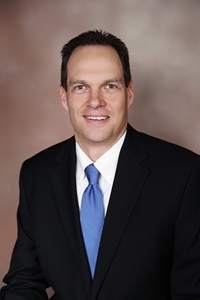
Bret Afdahl was appointed director of the South Dakota Division of Banking in May 2011 after serving as counsel to the division since October 2006. Afdahl is the current chair of the Conference of State Bank Supervisors (CSBS), the nation’s leading advocate for the state banking system and the only national organization dedicated to advancing the state banking system. Prior to joining the division, Afdahl worked on the legal staff at the South Dakota Department of Revenue and Regulation on a variety of tax and compliance issues. He is a graduate of Northern State University with a degree in political science and business, a graduate of the University of South Dakota School of Law, and holds a certification as a fiduciary and investment risk specialist (CFIRS) from the Cannon Financial Institute.
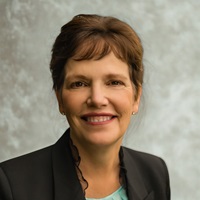
Leslie Andersen, Chief Executive Officer of i3 Bank, is a fourth-generation member of the founding family. She has over thirty years of banking experience and a proven track record of extensive leadership within the industry overall. Throughout her career, Leslie has served on many Industry Boards including Chairman of the American Bankers Association’s Government Relations Council, member of the Federal Advisory Council to the Board of Governors of the Federal Reserve, Banc Alliance Board of Directors, and Corporation for American Banking Advisory Board.
Ms. Andersen currently serves as a member of the Blue Cross Blue Shield of Nebraska Board of Directors, a Governor of the Knights of Ak-Sar-Ben Foundation, a trustee for the Nebraska Game and Parks Foundation, a member of the One Nebraska Board of Directors, a trustee for the Peter Kiewit Foundation, a member of the President’s Advisory Council for the University of Nebraska and The State of Nebraska Economic Forecasting Board.
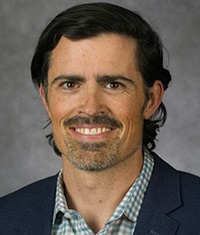 Lamont Black is an associate professor of finance in the Driehaus College of Business at DePaul University, Chicago, Illinois. Black is also the academic director of DePaul’s John L. Keeley Center for Financial Services. Prior to joining the faculty of DePaul, Black was an economist at the Federal Reserve Board of Governors in Washington, D.C. His main research interests are in the areas of banking, corporate finance and macroeconomics. His research has been published in numerous journals, including the Review of Financial Studies; the Journal of Money, Credit and Banking; and the Journal of Banking and Finance. Black teaches money, banking, and capital markets to undergraduate and graduate students. He received a Ph.D. in Finance, as well as his Ph.D. in Economics, from the Kelley School of Business at Indiana University. He received his bachelor's degree in Modern Thought and Literature from Stanford University.
Lamont Black is an associate professor of finance in the Driehaus College of Business at DePaul University, Chicago, Illinois. Black is also the academic director of DePaul’s John L. Keeley Center for Financial Services. Prior to joining the faculty of DePaul, Black was an economist at the Federal Reserve Board of Governors in Washington, D.C. His main research interests are in the areas of banking, corporate finance and macroeconomics. His research has been published in numerous journals, including the Review of Financial Studies; the Journal of Money, Credit and Banking; and the Journal of Banking and Finance. Black teaches money, banking, and capital markets to undergraduate and graduate students. He received a Ph.D. in Finance, as well as his Ph.D. in Economics, from the Kelley School of Business at Indiana University. He received his bachelor's degree in Modern Thought and Literature from Stanford University.

Michelle W. Bowman took office as the Vice Chair for Supervision of the Board of Governors of the Federal Reserve System on June 9, 2025, for a four-year term. Ms. Bowman has served as a member of the Board of Governors of the Federal Reserve System since taking office on November 26, 2018, to fill an unexpired term ending January 31, 2020. She was reappointed to the Board on January 23, 2020, and sworn in on January 30, 2020, for a term ending January 31, 2034.
Prior to her appointment to the Board, Ms. Bowman served as the state bank commissioner of Kansas from January 2017 to November 2018. She also served as vice president of Farmers & Drovers Bank in Kansas from 2010 to 2017. In addition to her experience in the banking industry, Ms. Bowman worked in Washington, D.C. for Senator Bob Dole of Kansas from 1995 to 1996 and served as a counsel to the U.S. House Committee on Transportation and Infrastructure and the Committee on Government Reform and Oversight between 1997 and 2002. In 2002, Ms. Bowman became director of congressional and intergovernmental affairs at the Federal Emergency Management Agency. From 2003 to 2004, she served as Deputy Assistant Secretary and policy advisor to Homeland Security Secretary Tom Ridge.
Following her time in Washington, D.C., Ms. Bowman led a government and public affairs consultancy based in London before returning to Kansas in 2010. Ms. Bowman received a BS in advertising and journalism from the University of Kansas and a JD from the Washburn University School of Law. She is a member of the New York Bar. Ms. Bowman is married with two children.

James Bullard is the president and CEO of the Federal Reserve Bank of St. Louis. In that role, he is a participant on the Federal Reserve’s Federal Open Market Committee (FOMC), which meets regularly to set the direction of U.S. monetary policy. He also oversees the Federal Reserve’s Eighth District, including activities at the St. Louis headquarters and its branches in Little Rock, Arkansas, Louisville, Kentucky, and Memphis, Tennessee. A noted economist and policymaker, Bullard makes Fed transparency and dialogue a priority on the international and national stage as well as on Main Street. He serves on the board of directors of the St. Louis Regional Chamber and the board of directors of Concordance Academy of Leadership, and he is a past board chair of the United Way U.S.A. Bullard is co-editor of the Journal of Economic Dynamics and Control, and a member of the Central Bank Research Association’s senior council. He is an honorary professor of economics at Washington University in St. Louis, where he also sits on the advisory council of the economics department and the advisory board of the Center for Dynamic Economics. A native of Forest Lake, Minnesota, Bullard received his doctorate in economics from Indiana University in Bloomington.
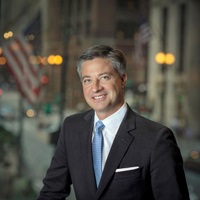
Michael Busch is the president and CEO of Chicago-based Burling Bank and Burling Ventures, wholly-owned subsidiaries of Burling Bancorp, Inc. Busch has more than 25 years of banking experience focused in the areas of regulatory compliance, risk management, operations, marketing, client service and business development. As president of Burling Bank, he is responsible for managing relationships with governmental agencies, business partners, civic organizations and financial technology vendors. Previously, he was an independent commodity futures trader and member of the Chicago Board of Trade. He also served as assistant White House press secretary to President George H.W. Bush. He received his Master of Business Administration from the University of Chicago’s Booth School of Business and a Bachelor of Science from Pepperdine University, Malibu, Calif. He currently serves on the boards of the Chicago Botanic Garden, the George & Barbara Bush Foundation Advisory Council, Pepperdine University’s Seaver Business Partners, the State Banking Board of Illinois and the Conference of State Bank Supervisors’ Bankers Advisory Board.
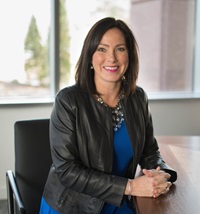
Melissa Eggleston is chief deposit officer and executive vice president at nbkc bank, Kansas City, Mo. She joined the bank in 2016 to lead the creation and execution of a nationwide digital banking platform for consumers and small businesses. As part of nbkc’s executive team, Eggleston works to form strategic partnerships and investment opportunities with a variety of fintechs across the country. She has spent more than 16 years in community banking, serving in various leadership roles focused on strategy, customer service, business development and team building. Eggleston is most passionate about delivering impactful strategic change to meet company objectives and disrupting traditional banking practices. She holds a Bachelor of Science in Business Management from Purdue University-Northwest and is a graduate of the University of Wisconsin-Madison Graduate School of Banking. Her work has been recognized with numerous awards for her professional and community leadership, including being named a NextGen Leader and one of the Kansas City Business Journal's Women Who Mean Business - the top honor for women in Kansas City's business community.
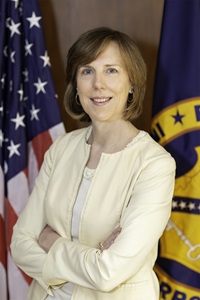
Diane Ellis is the director of the Division of Insurance and Research at the Federal Deposit Insurance Corporation (FDIC). The division is responsible for maintaining the adequacy of the Deposit Insurance Fund and an effective and fair risk-based premium system. It also leads the FDIC’s efforts to assess economic and financial sector risks to the banking industry; directs policy-oriented research, both in-house and through the FDIC’s Center for Financial Research; conducts analysis for FDIC rulemakings; and manages the collection and publication of bank financial information and statistics, including the Quarterly Banking Profile. The division disseminates research and analysis through a variety of channels, including published and online reports, as well as conferences and roundtables. Ellis started her FDIC career as a bank examiner in the Orange County, Calif., field office, where she examined numerous troubled banks and thrifts during a severe recession. She then joined the Division of Insurance in Washington, D.C. where she analyzed emerging risks to the banking and thrift industries, with particular emphasis on the consumer sector and credit conditions. Ellis has also served as Deputy to the Vice Chairman, Special Assistant to the Chief Operating Officer, Associate Director for Financial Risk Management, and Deputy Director for Financial Risk Management and Research. She currently serves on the executive council of the International Association of Deposit Insurers. She holds a Bachelor of Business Administration in Finance from Texas Christian University, Ft. Worth, Texas, and is a Chartered Financial Analyst.
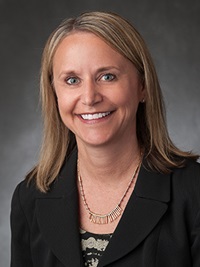
Christine Gaffney is senior vice president for Supervision, Regulation and Credit (SRC) at the Federal Reserve Bank of Minneapolis, where she oversees the consumer and safety and soundness supervision of state member banks and bank holding companies in the Federal Reserve’s Ninth District. She is also responsible for the Bank’s lending to Ninth District depository institutions and for managing the resulting credit risk. Gaffney joined the Minneapolis Fed in 2001 in the SRC department as a consumer affairs examiner. She continued in the examination role until 2008. During that period, she spent one year at the Federal Reserve Board of Governors and four years as key support for the Federal Reserve System’s examiner training efforts. She managed SRC’s quality assurance and training functions before becoming an assistant vice president in 2011 and then vice president in 2014 over the credit, payments systems risk, statistical and structure reporting, and support services areas. Throughout her tenure, she has made a wide range of contributions, including leading several critical System efforts as well as helping SRC grow its areas of formal responsibility. Gaffney has a Bachelor of Arts from the University of Jamestown in North Dakota.
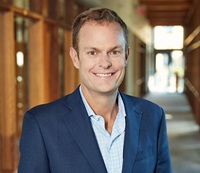
Huntley Garriott is the president of Live Oak Bank, Wilmington, N.C. Prior to joining Live Oak, he was a partner at Goldman Sachs in its investment banking division and served as co-head of the Banks and Specialty Finance team within Goldman’s Financial Institutions Group. During his 20-year career at Goldman, Garriott covered regional banks throughout North America and held a variety of roles focused on traditional investment banking, private equity investing, debt capital markets and risk management. He was named managing director in 2007 and partner in 2014. Garriott earned a Bachelor of Arts in mathematics and economics from the University of Virginia, where he was a Jefferson Scholar.
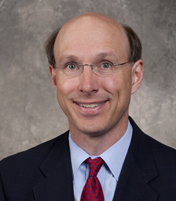
Michael S. Gibson is the director of the Division of Supervision and Regulation at the Federal Reserve Board of Governors. As division director, he oversees the Federal Reserve’s development of bank regulatory policy and its supervision of banking organizations. He works closely with officials from other U.S. and international government agencies on bank oversight issues. He formerly served as deputy director in the Division of Research and Statistics at the Board of Governors, where he was responsible for overseeing the division’s financial functions. He has worked on research and policy issues related to financial stability, financial markets and derivatives. He has authored articles on value at risk, stress testing and credit derivatives. He served on the faculty of the University of Chicago Graduate School of Business for two years and as a visiting lecturer at Princeton University. He has a Ph.D. in economics from the Massachusetts Institute of Technology and a Bachelor of Arts in economics from Stanford University.
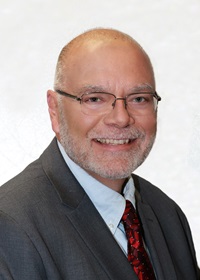
Craig Goodlock is the chairman and CEO of Farmers State Bank, Munith, Mich. Goodlock has been involved in the Michigan banking community since 1979. He graduated Summa Cum Laude with a Bachelor of Arts in business administration and a Bachelor of Arts in mathematics from Adrian College, Adrian, Mich. Goodlock is the only banker in Michigan to have chaired both the Michigan Bankers Association and the Michigan Association of Community Bankers. In 2009, he was voted Michigan Banker of the Year. Under Goodlock’s leadership, the bank has grown from one office in Munith to a $78 million bank with three locations in Munith, Stockbridge, and Grass Lake, Mich.

Yadav Gopalan is an assistant professor of accounting at the Kelley School of Business at Indiana University. His research interests include banking, financial reporting, disclosure regulation and credit market intermediaries. Before the start of his academic career, he spent six years as a research associate and financial analyst at the Federal Reserve Banks of Atlanta and St. Louis. In addition to his academic appointment at Indiana University, he is a visiting scholar at the Federal Reserve Bank of St. Louis. He earned his Ph.D. in business administration (accounting) and his Master of Science in finance from the John M. Olin Business School at Washington University in St. Louis. Gopalan earned his Bachelor of Science in economics from Michigan State University.
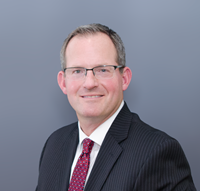
Jonathan Griffin is the senior vice president and chief business development officer at the Federal Home Loan Bank of Indianapolis (FHLBI). Griffin is responsible for business development functions to support FHLBI’s member products and services. He also oversees the advance trading desk, strategic planning, market research and analytics, membership recruitment and member capital stock. He joined FHLBI in 1996 as a senior credit analyst, serving later as the advances manager, then as an account manager. He was named first vice president and credit services director in 2007, where he oversaw all member credit underwriting, member collateral and member lending functions. Prior to joining FHLBI, Griffin spent several years working in corporate finance at an insurance holding company. He holds a bachelor's degree in finance from Butler University, Indianapolis, Ind., and an MBA with an emphasis in finance from Indiana University’s Kelley School of Business. Griffin is a Chartered Financial Analyst and a Fellow of the Life Management Institute.

John Hackney is an Assistant Professor of Finance at the Walton College of Business, University of Arkansas. He previously held the position of Assistant Professor of Finance at the Darla Moore School of Business, University of South Carolina. He has served on the program committee for the Community Banking Research Conference, and received the Most Important Contribution to Banking Policy Award at the 2019 Conference. His research focuses on entrepreneurship, FinTech, household finance, empirical corporate finance, and banking. John has a BA in Economics and Finance from Gonzaga University, and a MS and PhD in Finance and Business Economics from the University of Washington.
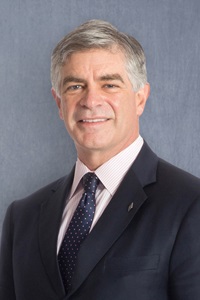
Patrick T. Harker is the president and CEO of the Federal Reserve Bank of Philadelphia. In this role, Harker participates on the Federal Open Market Committee, which formulates the nation’s monetary policy. Before taking office at the Philadelphia Fed, Harker was the 26th president of the University of Delaware. He was also a professor of business administration at the university’s Alfred Lerner College of Business and Economics and a professor of civil and environmental engineering at the College of Engineering. Before joining the University of Delaware in 2007, Harker was dean and Reliance Professor of Management and Private Enterprise at the Wharton School of the University of Pennsylvania. Prior to being appointed dean in 2000, Harker was the Wharton School’s interim dean and deputy dean, as well as the chair of its Operations and Information Management Department. He has published/edited nine books and more than 100 professional articles. From 1996 to 1999, he served as editor-in-chief of the journal Operations Research. In 2012, Harker was named a fellow of the Institute for Operations Research and the Management Sciences (INFORMS) and a charter fellow of the National Academy of Inventors. He was also named a White House fellow by President George H. W. Bush in 1991 and was a special assistant to Federal Bureau of Investigations Director William S. Sessions from 1991 to 1992. Harker is a board member of both the Chamber of Commerce for Greater Philadelphia and its Select Greater Philadelphia Council. He is also a board member at the Science Center in Philadelphia. Previously, he was on the boards of Catholic Relief Services, Pepco Holdings, Inc. and the Huntsman Corporation. He was a founding member of the board of advisors for Decision Lens Inc. He was also a nonbanking Class B director of the Philadelphia Fed from 2012 to 2015. Harker has a Ph.D. in civil and urban engineering, a Master of Arts in economics, a Master of Science in engineering and a Bachelor of Science in civil engineering, all from the University of Pennsylvania.

Artashes Karapetyan is an assistant professor of finance at ESSEC Business School in Paris, France. Prior to joining ESSEC, Karapetyan served as a faculty member at BI Business School in Norway, and as a research economist at Norges Bank, Norway’s central bank. Karapetyan’s research interests are real estate finance, housing and financial intermediation; in particular, relationship banking. In his work, he uses both theoretical and empirical methods, and has experience using international credit registry datasets from Norway, Portugal, and Hungary.

Stefan Lewellen is a visiting assistant professor of finance at The Pennsylvania State University (Penn State). Prior to joining Penn State, Lewellen held academic positions at Carnegie Mellon University and the London Business School. His primary research interests are in the areas of corporate finance, financial intermediation, political economy and industrial organization. His work on corporate finance received SAC Capital’s award for outstanding research, and his work on financial intermediation has been published in the American Economic Review. His research has been cited by numerous media outlets including the Economist, the Harvard Business Review, and NPR’s Hidden Brain. Stefan earned his Ph.D. and MBA from Yale University. He received his Bachelor of Business Administration in Engineering Route to Business (Finance, Aerospace Engineering) from the University of Texas at Austin.
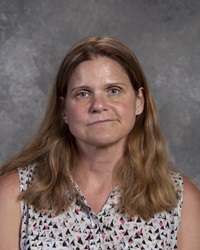
Traci Mach is a principal economist in the financial structure section of the Division of Research and Statistics at the Federal Reserve Board of Governors. She joined the Board of Governors staff in 2003. While at the Board, Mach has been involved in conducting economic analysis of issues relating to the household and small business finance, working extensively with the Board’s Survey of Small Business Finances and its Survey of Consumer Finances. Mach received her bachelor’s degree from Cornell College, Mt. Vernon, Iowa, and her Ph.D. in economics from The Ohio State University. Prior to joining the Federal Reserve Board, Mach served on the faculty of the economics department at the State University of New York at Albany.
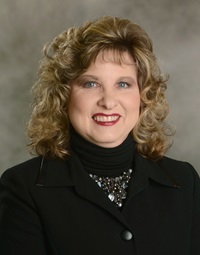
Lori A. Maley is the vice chairman, president and CEO of the Bank of Bird-in-Hand, Bird-in Hand, Penn. From the bank’s inception in 2013 until 2017, Maley served as the bank’s chief financial officer and executive officer, as well as the assistant treasurer and assistant secretary. Prior to joining the Bank of Bird-in-Hand, Maley was the acting chief accounting officer, controller and senior vice president of Phoenixville, Pa.-based Customers Bank. She had previously served as the chief financial officer, executive vice president and treasurer of Wyomissing, Pa.-based Berkshire Bank and as the comptroller of Pennsylvania National Bank. Maley holds a Bachelor of Science in business administration with a concentration in accounting from Bloomsburg University, Bloomsburg, Pa., and a master’s degree in finance from St. Joseph University in Philadelphia. She is a Certified Public Accountant. Committed to sharing her expertise with others, she has taught at several schools including Kutztown University, The Pennsylvania State University, Albright College and Muhlenberg College. In 2018, she received the Pennsylvania Bankers Association’s Patricia A. Husic Woman of Influence Award and was selected as a finalist for EY’s Entrepreneur Of The Year® Award in the greater Philadelphia region.
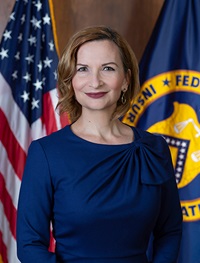 Jelena McWilliams was sworn in as the 21st chairman of the Federal Deposit Insurance Corp. (FDIC) on June 5, 2018. She serves a six-year term on the FDIC Board of Directors, and is designated as chairman for a term of five years. Prior to joining the FDIC, McWilliams was executive vice president, chief legal officer and corporate secretary for Fifth Third Bank in Cincinnati, Ohio. Prior to joining Fifth Third, she worked in the United States Senate for six years, most recently as chief counsel and deputy staff director with the Senate Committee on Banking, Housing and Urban Affairs, and as assistant chief counsel with the Senate Small Business and Entrepreneurship committee. From 2007 to 2010, McWilliams served as an attorney with the Federal Reserve Board of Governors. Before entering public service, she practiced corporate and securities law at Morrison & Foerster LLP in Palo Alto, California, and Hogan & Hartson LLP (now Hogan Lovells LLP) in Washington, D.C. She graduated with highest honors from the University of California at Berkeley with a Bachelor of Science in political science, and earned her Juris Doctor from the UC Berkeley School of Law.
Jelena McWilliams was sworn in as the 21st chairman of the Federal Deposit Insurance Corp. (FDIC) on June 5, 2018. She serves a six-year term on the FDIC Board of Directors, and is designated as chairman for a term of five years. Prior to joining the FDIC, McWilliams was executive vice president, chief legal officer and corporate secretary for Fifth Third Bank in Cincinnati, Ohio. Prior to joining Fifth Third, she worked in the United States Senate for six years, most recently as chief counsel and deputy staff director with the Senate Committee on Banking, Housing and Urban Affairs, and as assistant chief counsel with the Senate Small Business and Entrepreneurship committee. From 2007 to 2010, McWilliams served as an attorney with the Federal Reserve Board of Governors. Before entering public service, she practiced corporate and securities law at Morrison & Foerster LLP in Palo Alto, California, and Hogan & Hartson LLP (now Hogan Lovells LLP) in Washington, D.C. She graduated with highest honors from the University of California at Berkeley with a Bachelor of Science in political science, and earned her Juris Doctor from the UC Berkeley School of Law.
 Andrew P. Meyer is a senior economist in the Community Bank Research and Outreach office of the Federal Reserve Bank of St. Louis. He received a doctorate in economics from Washington University in St. Louis and has worked at the Federal Reserve since 1994. In addition to his research on community banking issues, Meyer conducts statistical analysis of the downgrade and failure risk of commercial banks. He also serves on a committee to improve the Federal Reserve's off-site bank surveillance program and has taught regularly in examiner training schools.
Andrew P. Meyer is a senior economist in the Community Bank Research and Outreach office of the Federal Reserve Bank of St. Louis. He received a doctorate in economics from Washington University in St. Louis and has worked at the Federal Reserve since 1994. In addition to his research on community banking issues, Meyer conducts statistical analysis of the downgrade and failure risk of commercial banks. He also serves on a committee to improve the Federal Reserve's off-site bank surveillance program and has taught regularly in examiner training schools.

Carlos Parra received his Ph.D. in finance from the McCombs School of Business at the University of Texas at Austin and is working as an assistant professor of finance at Pontifical Catholic University of Chile, Santiago, Chile. His primary research interests are in financial intermediation, household finance,and empirical corporate finance. In addition, his research uses quasi-experimental research designs to investigate the effect of financial regulations and the consequences of household financial distress.
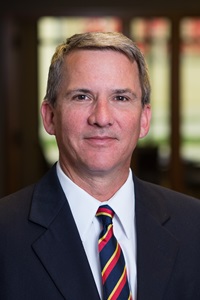
Gary Petersen is the chairman of North Dakota-based Cornerstone Bank and Cornerstone Holding Company. He is currently a member of the Ninth District Federal Reserve Community Depository Institutions Advisory Council, as well as the chairman of advisory board for the Bank of North Dakota, the only state-owned bank in the country. He is a past director and chairman for the North Dakota Bankers Association Board and was previously a member of the North Dakota Department of Banking and Financial Institutions Board. Gary has served on numerous other community boards and has been an active volunteer for community events. He earned his Bachelor of Business Administration and Juris Doctor from the University of North Dakota and is a member of the State Bar Association of North Dakota.
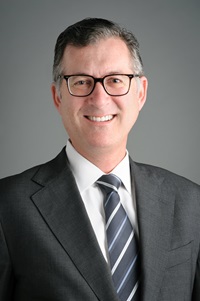
John W. Ryan is the president and CEO of the Conference of State Bank Supervisors, the national association representing state banking supervisors and the leading advocate for advancing the state banking system. Before being named CSBS president and CEO in August 2011, Ryan was CSBS's executive vice president, a position he had held since October 2003. He first joined CSBS in 1997 as an assistant vice president for legislative affairs. Prior to joining CSBS, Ryan worked at Newmyer Associates, a public affairs consulting firm, where he led the company's financial services consulting practice. Previous to his work at Newmyer Associates, Ryan spent four years as a professional staff member to the U.S. House of Representatives Committee on Banking, Finance and Urban Affairs. Ryan received a bachelor's degree in political science and economics from the University of California-Berkeley.

Alisha Sears is a senior analyst in the policy development group with the Conference of State Bank Supervisors (CSBS). Sears provides analytical and operational support to the regulatory committee, the legislative committee and the state supervisory processes committee, as well as taskforces, and interagency groups that contribute to the CSBS policy development process. She has also been integral in planning and managing several projects associated with the Community Banking Research Conference. Prior to joining CSBS in the spring of 2018, Sears was with the Financial Industry Regulatory Authority (FINRA). She has also held positions with the Securities and Exchange Commission (SEC), law firms and an investment advisory firm. Sears received her Juris Doctor from the University of Maryland and her undergraduate degree from the University of Michigan. She is a member of the Maryland State Bar Association and the American Bankers Association Banking Law Committee, as well as Women in Housing and Finance.

Padma Sharma is an economist at the Federal Reserve Bank of Kansas City. Her main research interests are in the areas of banking and econometrics. In her recent research, she quantifies the impact of government guarantees on bank balance sheets and evaluates the economic effects of distress in the banking sector by developing new econometric tools. Sharma received her Ph.D. in economics from the University of California at Irvine and was a dissertation intern at the Federal Reserve Bank of New York. She received her Bachelor of Science in economics, mathematics and statistics from Bangalore University and her Master of Science in economics from the Indira Gandhi Institute of Development Research, Mumbai, India. Prior to receiving her Ph.D., Sharma was a banker and a consultant, and developed statistical models of regulatory capital for banks in Europe, Asia and North America.
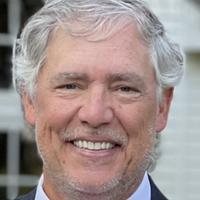
Thomas Siems is the chief economist with the Conference of State Bank Supervisors (CSBS). He joined CSBS in 2019 after serving 34 years at the Federal Reserve Bank of Dallas and more than 20-year teaching at Southern Methodist University in Dallas. Siems earned a Bachelor of Science in industrial and operations engineering from the University of Michigan and his Master of Science and Ph.D. degrees in operations research from Southern Methodist University. Siems is also a graduate of the Graduate School of Banking at Colorado and has published more than 75 articles in academic, Federal Reserve and referred journals. He delivered a 2015 TEDxSMU Talk, “The Wealth of Innovations,” and has authored five children’s picture books, including “The Dangerous Pet,” which poetically helps readers understand the dangers of debt.

Kandarp Srinivasan is an assistant professor of finance at the D'Amore-McKim School of Business, Northeastern University, Boston. He received his doctorate in finance from Washington University in St. Louis, his Master of Science in finance from Barcelona Graduate School of Economics in Barcelona, Spain, and his MBA from the Indian Institute of Management (IIM) in Bangalore, India. His research interests are in banking, financial crises and bankruptcy. Prior to his Ph.D., Kandarp worked as an investment banking analyst with the Royal Bank of Scotland in Hong Kong in its mergers and acquisitions division.
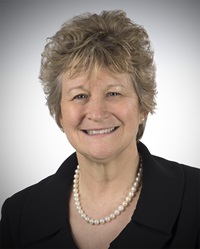
Julie Stackhouse is executive vice president and managing officer of supervision, credit, community development and learning innovation for the Federal Reserve Bank of St. Louis. Prior to joining the St. Louis Fed in September 2002, Stackhouse served as vice president and managing officer of the Risk Management department of the Federal Reserve Bank of Minneapolis. In addition, she was formerly an officer with the Federal Reserve Bank of Kansas City prior to relocating to Minnesota in 1995. She served in many capacities at the Kansas City Reserve Bank, starting as an examiner in 1980. Stackhouse holds a bachelor's degree in business administration from Drake University and is a graduate of the Wisconsin Graduate School of Banking. She currently serves as president-elect of the Board for National Charity League, Inc., a mother-daughter philanthropic organization, and as a member of the St. Louis Forum. In 2010, Stackhouse was named a St. Louis Business Journal “Most Influential Business Women” recipient, and in 2016, was recognized with the Delta Sigma Pi Lifetime Achievement Award.

Michael Stevens is the senior executive vice president at the Conference of State Bank Supervisors (CSBS). He is responsible for leading the organization's public policy, financial supervision, federal coordination, communications, industry relations and professional development functions. Stevens also serves as the principal deputy to the state banking member of the Financial Stability Oversight Council. Prior to his appointment in September 2011, he served as the senior vice president for regulatory policy, representing the state banking system in the development of policy in the areas of financial stability, prudential supervision and consumer protection. He joined CSBS in 1999 to work in all facets of CSBS's professional development division. Stevens is a frequent instructor and speaker on banking policy, examinations and financial analysis. He serves on the faculty of the Graduate School of Banking at Colorado and at Texas Tech University's School of Banking. He began his regulatory career as a bank examiner for the Iowa Division of Banking, where he served 11 years.
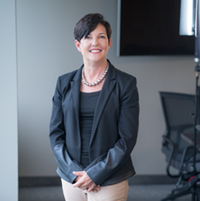
Julieann M. Thurlow is the president and CEO at Reading Cooperative Bank (RCB) in Reading, Mass. She joined the bank in 1993 and rose through the lending ranks to become its president in 2006. At that time, the bank had four branches and $237.6 million in total assets. It now has assets of $580 million and eight branches. Thurlow is responsible for the strategic direction and management of the Bank. In 2014, Julie was named to the Federal Reserve Bank of Boston’s Community Advisory Council. She is a former trustee for the Cooperative Bank Employee Retirement Association and the Massachusetts Bankers Association’s Federal Liaison Committee. She is a board member of the American Bankers Association and presently serves on its government relations council and membership council, having previously served on its professional development council, mutual advisory council and the financial task force for regulatory reform. She serves the local banking industry as a member of the board of the Cooperative Central Bank, and is chair of its finance and audit committee. Thurlow is also a director at Atlantic Community Bankers Bank, which provides correspondent and other innovative services to banks and credit unions. She was a founding member of BancAlliance, Inc. In 2014 and 2017, she was named by American Banker magazine as one of the top 25 Women to Watch in Banking. In addition, she has earned a spot on the Commonwealth Institute’s Top 100 Women-Led Businesses in Massachusetts for the last four years running. Thurlow is the president of the Reading Cooperative Charitable Foundation and is active in identifying and supporting organizations and projects that improve the quality of life. In addition to receiving an MBA from the Charles F. Dolan School of Business at Fairfield University, Fairfield, Conn., she completed advanced studies at the Stonier National School of Banking, the Massachusetts School of Financial Studies and Harvard Business School’s Division of Continuing Education.

Francesco Vallascas is professor of banking in the accounting and finance division at the University of Leeds, Leeds, England. Vallascas has previously worked as a lecturer in financial intermediation at the University of Cagliari in Cagliari, Sardinia, Italy. He has collaborated with academics in Germany, Sweden, and the U.S. and with policymakers from several organizations. He is the deputy director of the Center for Advanced Studies in Finance (CASIF) and the deputy director of the International Banking Institute at the Leeds University Business School. His research interests are in bank regulation, governance and systemic risk of European and U.S. banks. In particular, Vallascas has examined the effectiveness of corporate governance and regulatory mechanisms in limiting risk-taking by banks. He has collaborated with the European Commission on several research projects.

Rajesh Vijayaraghavan is an assistant professor of accounting at the University of British Columbia’s Sauder School of Business, Vancouver, Canada. His research focuses on risk management, financial reporting and corporate governance with a special interest in understanding financial institutions. He is also interested in the application of machine learning and artificial intelligence for questions relevant to banking policy. Prior to his academic career, Rajesh worked in risk management at an investment bank in New York. Rajesh earned his doctorate in accounting and management from Harvard Business School, Boston. His dissertation focused on examining the bank loan loss accounting rules, and the implementation aspects of the current expected credit losses standard. He holds bachelor’s degree in technology from the University of Madras, India and a Master of Science from New York University’s Courant Institute of Mathematical Sciences.

Teng Wang is a senior economist in the Board of Governors of the Federal Reserve System. He completed a PhD in Finance, and MPhil with cum laude from the Erasmus University in the Netherlands. Teng maintains an active research pipeline on a variety of topics related to financial intermediation, credit availability and risks, law and finance, as well as corporate finance and innovation. He has published peer-reviewed articles in academic journals including the Journal of Financial and Quantitative Analysis, Management Science, and Journal of Banking and Finance. He is a regular presenter at various conferences including the American Economic Association Annual Meetings, Financial Management Association Annual Meetings, and Financial Intermediation Research Society Meetings. In addition, Dr. Wang contributes to the Federal Reserve's financial stability and responsibilities, including conducting research and facilitate key policy and technical decision-making on all issues related to the implementation of the Dodd-Frank Act supervisory stress tests.
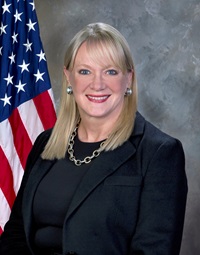
Robin Weissmann has served as the Pennsylvania Secretary of Banking and Securities since 2015. Throughout her career, she has led strategic operations related to commercial and investment banking, regulatory policy and government. Under her leadership, the Pennsylvania Department of Banking and Securities has demonstrated a commitment to consumer protection and responsible innovation. Wiessmann has advocated for cybersecurity, financial capability and executive leadership for women, as well as safe harbor for banks to serve state-compliant marijuana-related businesses. For the Governor’s Consumer Financial Protection Initiative, she provides strategic oversight of a financial information exchange that coordinates efforts of more than 20 state government agencies. Wiessmann has served as chair of the Conference of State Bank Supervisors (CSBS) Non-Depository Supervisory Committee. She is currently CSBS board secretary. She is also the chair of the board of directors of the Pennsylvania Housing Finance Agency and is a member of eight other economic development, policy, and supervisory boards, including the Pennsylvania Higher Education Assistance Agency, the Public School Employees’ Retirement System and the State Employees’ Retirement System. Before being appointed to her current role, Wiessmann served as deputy director of finance for the city of Philadelphia and as treasurer of the state of Pennsylvania. During her private career, Wiessmann held leadership positions at Goldman Sachs and Merrill Lynch. She was a founding principal and president of Artemis Capital Group, the first women-owned investment banking firm on Wall Street. In addition, Wiessmann served as chairman of the board for Vantagepoint Funds Mutual Fund, and on the board of Municipal Securities Rulemaking Board. In 2019, she received a lifetime achievement award as a Philadelphia Inquirer Influencer of Finance. She is a recipient of the Arthur E. Armitage, Sr. Distinguished Alumni Award from Rutgers Law School, from which she earned her law degree, and is a graduate of Lafayette College, Easton, Pa.

Zhonghua “George” Wu is an associate professor in real estate and finance and the Tibor and Sheila Hollo Research Fellow at Florida International University, Miami. He received a Ph.D. degree in business administration from the University of Wisconsin-Madison. Prior to his academic career, Wu worked as a research associate at the National Bureau of Statistics in China. His research areas are real estate finance and investments, corporate finance and banking. His recent research topics include impact of technology advances on commercial banks, executive compensation, and the effect of employee productivity on firm performance. He has published research on real estate investment trust corporate policies, commercial property market and empirical asset pricing in real estate.
Video Gallery

